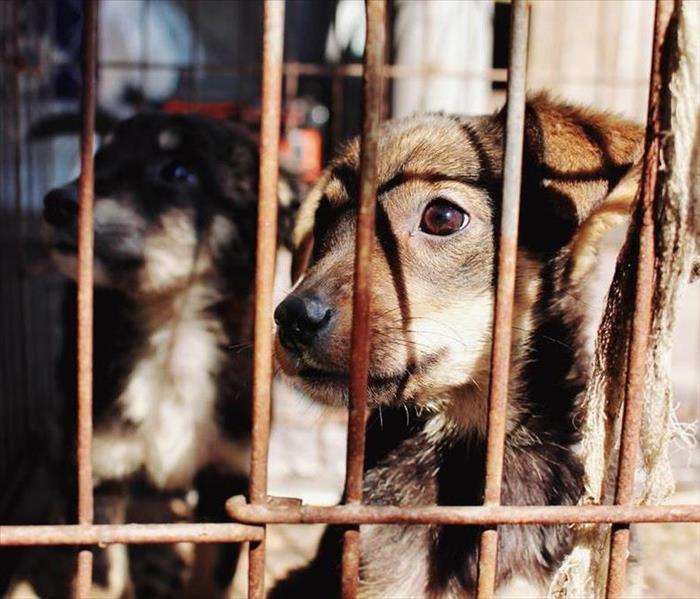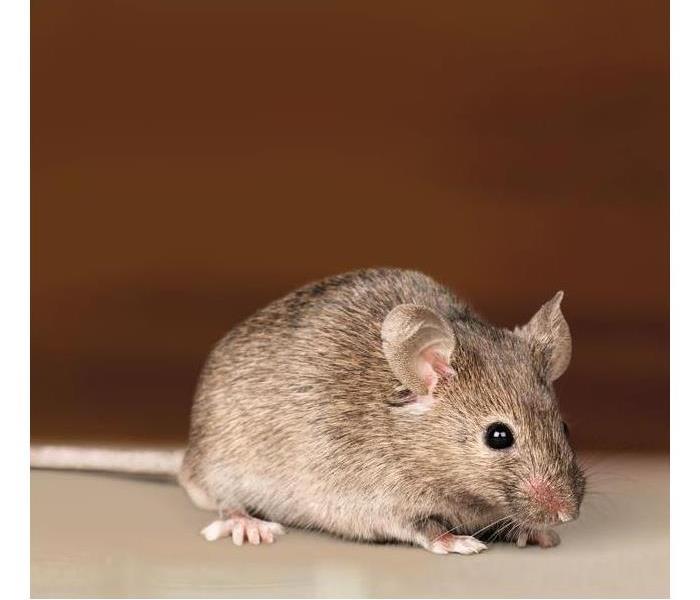What is Kennel Cough and How SERVPRO Can Help
12/20/2021 (Permalink)
 Give SERVPRO of Southwest Wichita a call if you need a quote to disinfect your home or business (316) 260-9011.
Give SERVPRO of Southwest Wichita a call if you need a quote to disinfect your home or business (316) 260-9011.
Kennel cough is a very contagious upper-respiratory infection caused by bacteria (Bordetella bronchiseptica) that is spread through saliva and/or air borne particles, either through direct contact or through exposure to surfaces that an infected dog has had contact with. Kennel Cough is the most common upper respiratory infection of dogs of all ages. It is most often identified by a persistent hacking, gagging, or unproductive cough. Some dogs may even experience low energy, decreased appetite, or may be asymptomatic but still contagious.
Any one of these common situations can put your dog at increased risk for Kennel Cough:
- Dog park visits
- Vet visits
- Grooming
- Day Care
- Boarding
- Multi-dog households
- Training Classes
- Daily walks or contact with other dogs
- Chronic heart or lung disease
- Compromised Immune System
- Commercial transport
- Recent adoption from shelter, rescue
How Can SERVPRO Help?
SERVPRO has their own professional cleaning products we use, SERVPROXIDE is designed to kill harmful bacteria, viruses and mold on hard surfaces and is an effective sanitizer for soft surfaces. It carries the EPA’s lowest toxicity rating making it safe for everyday use. This is especially helpful for business such as shelters, and vets where they may have been affected. Give SERVPRO of Southwest Wichita a call if you need a quote to disinfect your home or business (316) 260-9011.
Rodent Health Risks
11/26/2021 (Permalink)
 Give SERVPRO of Southwest Wichita a call (316) 260-9011.
Give SERVPRO of Southwest Wichita a call (316) 260-9011.
It's hard to stay healthy during the winter, we are constantly fighting the common cold, the flu, and now covid. One thing most people don't think about this time of year is the threat posed by rodents to both our health and property. During colder months, mice and rats are on the hunt for food, and warmth. This means they are often entering homes and businesses and can go unnoticed for quite some time. Rodents invade an estimated 21 million homes in the U.S. every winter, and an infestation can cause more than just some property damage, mice and rat feces can cause hazardous bacteria to spread. When the fecal matter of a mouse or rat dries it can become extremely dangerous to those who breathe it in. Some of the most common and sometimes deadly diseases or viruses are listed below:
Hantavirus
Hantavirus is a potentially life-threatening disease transmitted to humans by rodents-primarily, the white-footed deer mouse. People become infected through exposure or inhalation of infected rodent urine, droppings or saliva, and the chances increase when people are near spaces where rodents are actively living.
Bubonic Plague
Also known as the "Black Death", the Plague is a highly contagious and often deadly disease notorious for killing one-third of the European population during the Middle Ages. Plague is usually spread by the bite of an infected rodent flea and can cause fever, headache, and painfully swollen lymph nodes.
Salmonellosis
Salmonellosis is a type of food poisoning spread by rodent feces, especially through the consumption of contaminated food.
Rat-Bite Fever
Rat-bite fever (RBF) is a potentially fatal infectious disease spread by infected rodents or the consumption of food contaminated by rodents. The CDC says that symptoms usually occur 3-10 days after exposure to an infected source and include fever, vomiting, headaches, rash, and muscle pain.
Not only can rodents in your home cause health effects they can also destroy your home. They can tear through insulation and chew through drywall, cardboard, wood, and electrical wiring. SERVPRO of Southwest Wichita can not only remove your infested insulation but we can remove the feces and sanitize so you don’t have to worry about any bacterial diseases effecting your home. We use HEPA grade vacuums, EPA registered disinfectant and will also deodorize the area.
Give SERVPRO of Southwest Wichita a call if your home or business has experienced a possible infestation (316) 260-9011.
 Give SERVPRO of Southwest Wichita a call if you need a quote to disinfect your home or business (316) 260-9011.
Give SERVPRO of Southwest Wichita a call if you need a quote to disinfect your home or business (316) 260-9011.





 24/7 Emergency Service
24/7 Emergency Service
